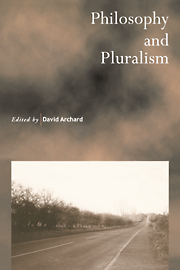Book contents
- Frontmatter
- Contents
- Notes on Contributors
- Introduction
- Philosophy in Different Cultural Contexts
- A Case for Philosophical Pluralism: The Problem of Intentionality
- William James, ‘A Certain Blindness’ and an Uncertain Pluralism
- Cultural Realism: the ancient philosophical background
- Religion and Pluralism
- A Single True Morality? The Challenge of Relativism
- Pluralism, Realism and Truth
- Value-Pluralism
- Moral Philosophy and its Anti-pluralist Bias
- Coping with the Many-Coloured Dome: Pluralism and Practical Reason
- Rawlsians, Pluralists, and Cosmopolitans
- Political Liberalism, Secular Republicanism: two answers to the challenges of pluralism
- ‘Race’ in Britain and the Politics of Difference
- Tragedy, Moral Conflict, and Liberalism
- References
Rawlsians, Pluralists, and Cosmopolitans
Published online by Cambridge University Press: 30 October 2009
- Frontmatter
- Contents
- Notes on Contributors
- Introduction
- Philosophy in Different Cultural Contexts
- A Case for Philosophical Pluralism: The Problem of Intentionality
- William James, ‘A Certain Blindness’ and an Uncertain Pluralism
- Cultural Realism: the ancient philosophical background
- Religion and Pluralism
- A Single True Morality? The Challenge of Relativism
- Pluralism, Realism and Truth
- Value-Pluralism
- Moral Philosophy and its Anti-pluralist Bias
- Coping with the Many-Coloured Dome: Pluralism and Practical Reason
- Rawlsians, Pluralists, and Cosmopolitans
- Political Liberalism, Secular Republicanism: two answers to the challenges of pluralism
- ‘Race’ in Britain and the Politics of Difference
- Tragedy, Moral Conflict, and Liberalism
- References
Summary
Some of us were introduced to political philosophy as an activity of identifying, criticising, and revising the moral basis of existing social institutions. We asked questions about the nature of the good or the just society, and some few of us thought that once we knew and advocated the truth, it would win out. We, or some appropriate revolutionary or reforming group or class, would with reason, truth, and history on our side, bring about the society of our ideals. When we first read John Rawls's A Theory of Justice we read it as continuing the traditional tasks of political philosophy. Justice as Fairness was a moral theory which addressed a political subject matter. From the moral point of view it told us what any just society aiming to realise the values of liberty and equality would be like. This comported nicely with liberal cosmopolitanism, and also with more widely shared philosophical views that the task of political philosophy is to construct a vision of an ideal society, perhaps more sensitive to justice in implementation than would be required in pre-modern, pre-democratic societies, but nevertheless an ideal which in the long run we would hope to see all societies converge on. That kind of liberalism gave those of us who think that Rawlsian justice is the right or true justice a license to go on the offensive in promoting liberal ideals and practices in our own society, and, at the very least, a critical vantage point from which to judge other societies.
- Type
- Chapter
- Information
- Philosophy and Pluralism , pp. 147 - 162Publisher: Cambridge University PressPrint publication year: 1996

